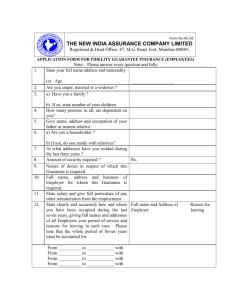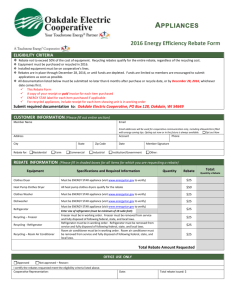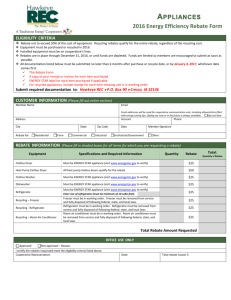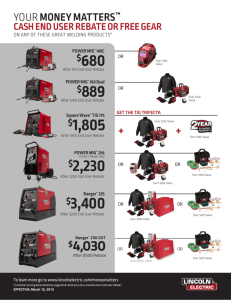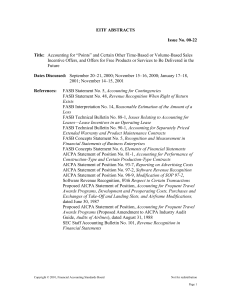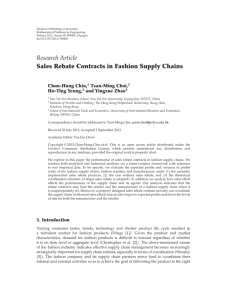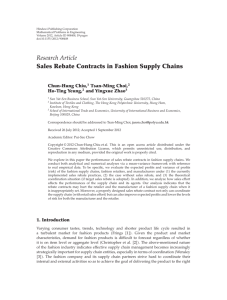Fall - BL Garbens Associates Inc.
advertisement
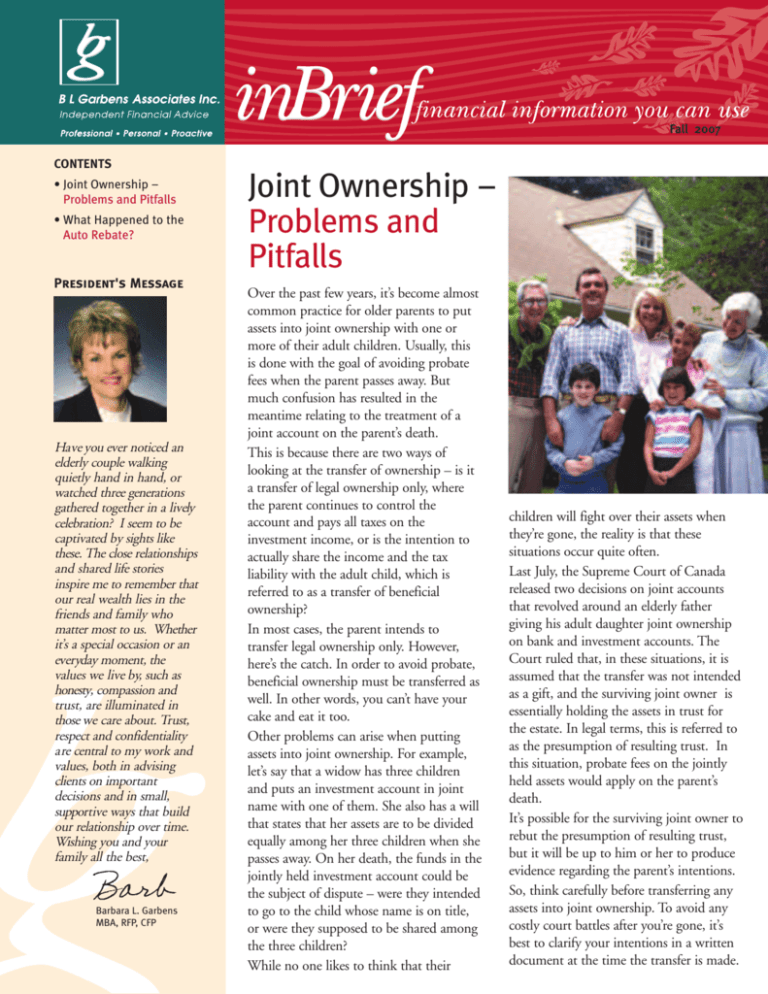
Fall 2007 CONTENTS • Joint Ownership – Problems and Pitfalls • What Happened to the Auto Rebate? President's Message Have you ever noticed an elderly couple walking quietly hand in hand, or watched three generations gathered together in a lively celebration? I seem to be captivated by sights like these. The close relationships and shared life stories inspire me to remember that our real wealth lies in the friends and family who matter most to us. Whether it’s a special occasion or an everyday moment, the values we live by, such as honesty, compassion and trust, are illuminated in those we care about. Trust, respect and confidentiality are central to my work and values, both in advising clients on important decisions and in small, supportive ways that build our relationship over time. Wishing you and your family all the best, Barbara L. Garbens MBA, RFP, CFP Joint Ownership – Problems and Pitfalls Over the past few years, it’s become almost common practice for older parents to put assets into joint ownership with one or more of their adult children. Usually, this is done with the goal of avoiding probate fees when the parent passes away. But much confusion has resulted in the meantime relating to the treatment of a joint account on the parent’s death. This is because there are two ways of looking at the transfer of ownership – is it a transfer of legal ownership only, where the parent continues to control the account and pays all taxes on the investment income, or is the intention to actually share the income and the tax liability with the adult child, which is referred to as a transfer of beneficial ownership? In most cases, the parent intends to transfer legal ownership only. However, here’s the catch. In order to avoid probate, beneficial ownership must be transferred as well. In other words, you can’t have your cake and eat it too. Other problems can arise when putting assets into joint ownership. For example, let’s say that a widow has three children and puts an investment account in joint name with one of them. She also has a will that states that her assets are to be divided equally among her three children when she passes away. On her death, the funds in the jointly held investment account could be the subject of dispute – were they intended to go to the child whose name is on title, or were they supposed to be shared among the three children? While no one likes to think that their children will fight over their assets when they’re gone, the reality is that these situations occur quite often. Last July, the Supreme Court of Canada released two decisions on joint accounts that revolved around an elderly father giving his adult daughter joint ownership on bank and investment accounts. The Court ruled that, in these situations, it is assumed that the transfer was not intended as a gift, and the surviving joint owner is essentially holding the assets in trust for the estate. In legal terms, this is referred to as the presumption of resulting trust. In this situation, probate fees on the jointly held assets would apply on the parent’s death. It’s possible for the surviving joint owner to rebut the presumption of resulting trust, but it will be up to him or her to produce evidence regarding the parent’s intentions. So, think carefully before transferring any assets into joint ownership. To avoid any costly court battles after you’re gone, it’s best to clarify your intentions in a written document at the time the transfer is made. What Happened to the Auto Rebate? Saving energy and going green has certainly become the theme of the moment. Even the federal government got on the bandwagon earlier this year with its incentives for purchasing more fuel-efficient vehicles. But, since its plans were introduced in last March’s budget, consumers and car salespeople alike have been unsure as to how to proceed. What’s the story with the proposed rebates? First of all, let’s look at what the budget proposals covered. The EcoAUTO Rebate Program offers rebates ranging from $1,000 to $2,000 to people who buy or lease a fuel-efficient vehicle in Canada beginning March 20, 2007. Leases must be for a period of at least 12 months. The vehicle must be new, i.e. not previously registered in Canada, although dealer demonstrators will qualify. The government has created a list of 2006 and 2007 models that meet the fuel consumption criteria for the program. Eligible models include cars that get 6.5 L / 100 km or better (such as the Mini Cooper, Toyota Yaris, Nissan Ultima Hybrid, and Honda Civic Hybrid) and light trucks that get 8.3 L / 100 km or better, including the Jeep Patriot and the Toyota Highlander Hybrid 4 x 4. There is also provision for new flexible-fuel vehicles that can use a fuel mixture with 85% ethanol (the E85 blend) – these will qualify if they get 13.0 L / 100 km or better. The problem with this program has been the time lag between its introduction and actual implementation. To be fair, the government stated up front that it would take some months to put the process in place. They are aiming to issue rebate cheques this fall. In the meantime, hold onto your proof of purchase or long-term lease agreement, and wait for further instructions. In the meantime, here are a few things you might like to know: • The rebate may be claimed by an individual consumer or a business. If an individual is using the vehicle for personal purposes, the rebate is not taxable. If it is acquired for business use, the business may pay tax on the rebate or it may reduce the vehicle’s depreciable cost. An employee who is entitled to deduct vehicle expenses in computing employment income will be required to reduce the vehicle’s depreciable cost. • The list of eligible vehicles will be updated periodically. However, at this time, 2008 models have not yet been added to the list. • Ontario has a program that provides for a refund of retail sales tax on the purchase or lease of new or used vehicles if the vehicles operate on an alternative fuel. See our sidebar for further details. MO RE O N RE BA TE S FO R ENERGY EFF I CI ENT VEH IC LES For more information about the federal rebate program, visit the Transport Canada website at www.tc.gc.ca/ prog ram s/e nvi ron me nt/ ec ot ra nspo rt /e co a uto .ht m . This link to the EcoAUTO Rebate Program will give you access to the lists of eligible vehicles, and the amount of rebate that applies to each one. Details of the rebate application process will be posted here once they’ve been worked out. Ontario’s program provides for a refund of the 8% retail sales tax paid on vehicles powered by alternative fuels, up to certain dollar limits. In addition, the tax for fuel conservation (TFFC) on new cars and SUVs may be refunded in full. This program has been in effect for several years, and refund applications can be submitted up to four years from the date the retail sales tax was paid. For more information on the Ontario program, visit www .re v.go v.o n. ca/ e ngl is h/ refund/vpaf. There is a link to the application form on this website. MATTERS OF INTEREST AUTO REBATE LATE BREAKING NEWS As of October 1, 2007, the application form is available on the Internet at www.ecoaction.gc.ca/ecoauto, at vehicle dealers, by calling the ecoAUTO toll free number at 1-866-506-6804, or by visiting any Service Canada Centre to download and print the form. Canadians simply need to fill out the easy-to-complete application, include appropriate documents for validation, and mail it to the address on the form. A cheque will be sent if the application is complete and successful. A list of eligible 2008 models is supposed to be posted “in the coming weeks”. B L Garbens Associates Inc. 39 Granlea Road, Toronto, ON M2N 2Z6 Tel. (416) 227-1543 Fax (416) 227-1547 email: bgarbens@pathcom.com www.blgarbens.com © 2007 B L Garbens Associates Inc. This newsletter is copyright, its reproduction in whole or in part by any means without the written consent of the copyright owner is forbidden.

